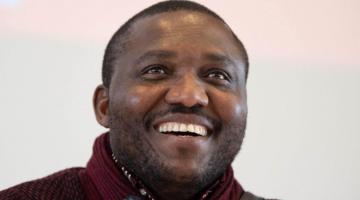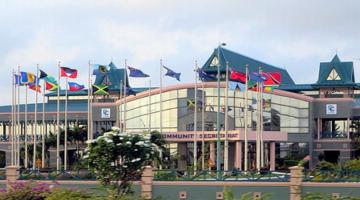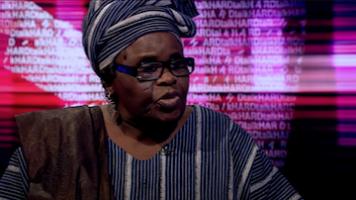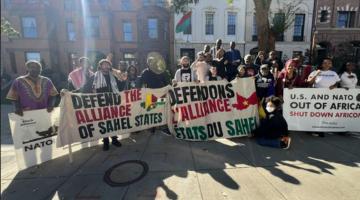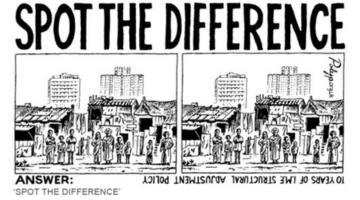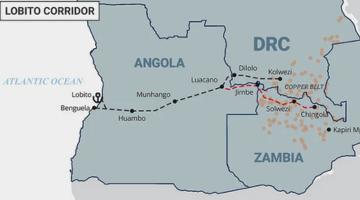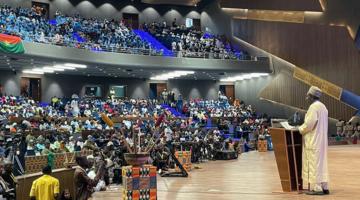French president Emmanuel Macron ensnares African nations in risky privatization schemes, a continuation of the colonial relationship.
This article originally appeared in Groupe d'études géopolitiques.
‘A French Jeremy Corbyn, and in power!’ you’d think after reading the first few paragraphs of Macron’s recent interview in Le Grand Continent. He condemns the Washington Consensus, the paradigm of ‘less state intervention, privatisations, structural reforms, opening up of economies through trade, financialisation of our economies, with a rather monolithic rationale based on the accumulation of profits’. The ‘financialised economy’, the monster child of the Washington Consensus which promised us welfare but gave us powerful financiers, has destroyed the environment, increased inequality and powered authoritarianism, bringing us to a political break point.
The Macron Doctrine, or the Paris Consensus, pledges to reverse those trends. To fight back against the ills of the financialised economy, Macron offers a three-pillar solution: more Europe, a true Europe-Africa partnership, and coalitions with governments and non-governmental players. Indeed, the Macron Doctrine is notionally post-colonial. It calls for re-inventing the ‘Afro-European Axis’ and puts the onus on Europeans to ‘show that this universalism we uphold is not universalism of the dominant, as it was during colonisation, but one of friends and partners’. If the Macron Doctrine for Europe is to make it ‘the leading power in education, health, digital and green policies’ with massive investments, by extension it promises a post-financialisation, post-colonial partnership with Africa.
Yet paradoxically, the Macron Doctrine – explicitly built on a critique of financialisation and privatisation of public goods – co-exists with the French push for the Wall Street Consensus, which promotes a partnership with global investors to financialise development and privatise public goods, particularly in Africa.
The Wall Street Consensus
For the last decade, the G20, the IMF, the World Bank and other multilateral development banks, (including the African Development Bank), and national development agencies (including the French Development Agency, the AFD) have pursued a new development agenda focused on a “grand bargain” with private finance: the Wall Street Consensus. Its logic is powerful. The global portfolio glut – the trillions managed by institutional investors, mostly from the Global North – could finance the Sustainable Development Goals, given the assumption of scarce public resources in the Global South. For instance, the World Bank’s Maximising Finance for Development agenda, introduced in 2017, promises institutional investors $12 trillion in market opportunities in the “WHITE sectors” – Welfare, Health, Infrastructure, Transportation, Education. But institutional investors are governed by specific investment rules that need to be accommodated if they are to finance development. The urgent development question then becomes: how to ‘escort’ institutional investors (pension funds, insurance companies, investment funds) and their asset managers towards these opportunities?
One intuitive answer could be: investors could buy more government bonds issued by African countries, in local currency to avoid the well-known problems of foreign debt sustainability, who in turn would use cheaper financing conditions to invest heavily in ‘education, digital, health and green’ public services, just like the champion of the Afro-Europe axis envisages for Europe. But this is not the correct answer.
Rather, private investors want ‘investible’ or ‘bankable’ development projects.
‘When thinking about whether a project is bankable, the first thing Multilateral Development Banks should be asking themselves is “will people pay to use it?” Investors are far more confident in returns when projects have a built-in set of users who are willing to pay’. This logic, neatly outlined by the Inter-American Development Bank, is echoed by all other multilateral development banks. It signals that the Wall Street Consensus is a project to reduce direct public investments in, and public delivery of services, and instead shift them to the private sector. The wrapping of the Washington Consensus privatisation agenda has changed, but the substance remains the same: citizens pay user fees for public services, now built and delivered via public-private partnerships (PPPs).
But the great ambition of the Wall Street Consensus is not simply a Thatcherite privatization onslaught. It is rather to transform the state, to reduce statecraft to derisking investments for global financiers. Where citizens cannot (afford to) pay, the state steps in and compensates investors, it ‘derisks’ development projects to ensure investors receive a steady cash flow. A bankable project is one where the state commits to put a safety net under investors.
And the COVID19 pandemic has renewed the political momentum behind this ambition. As the July 2020 manifesto of the Global Investors for Sustainable Development Alliance, working under the auspices of the United Nations, described their vision of the response to the COVID19 pandemic: “[T]he scale of the challenge calls for reinvigorating PPPs to a degree not experienced since World War II – and a degree that has perhaps never been seen in peacetime” . Similarly, the UN Climate Change conference (COP26) stream on private finance calls for ‘bespoke solutions’ for developing countries that include ‘public‐private partnerships, pipelines of bankable projects, and new market structures, to facilitate commercially viable opportunities for sustainable investment’.
The World Bank’s “PPP Imperative” for Africa, it would appear, just got more pressing.
The Afro-Europe Axis: planting budgetary time bombs in Africa
PPPs are long-term contractual arrangements through which the private sector commits to finance and manage public services – hospitals, highways, renewable energy plants, student accommodation, water and sewage etc – as long as the state shares the risks. For governments, this is an attractive arrangement because they do not need to provide funding for infrastructure projects upfront. States with significant infrastructure deficits and limited public resources, the argument goes, could delegate the execution of public service missions to the private sector without increasing their indebtedness. States need to assume some of the risks – that is, to derisk investments – but such derisking commitments do not count as public spending until and unless risks materialise.
In France, PPPs have long been denounced, including by the French court of Auditors (see here, here and here), for being more expensive than direct public investments, for worsening poverty, access and inequality. The French Senate described PPPs as a “budgetary time bomb“, then joined by the European Court of Auditors.
All these warnings, however, have not dampened the French government’s zeal to champion PPPs in Africa. For instance, the ‘Initiative France-Banque Mondiale’, promoted by the French Development Agency and its network of financial partners in the Franc zone countries in Africa, puts PPPs at the core of efforts to reinvigorate the French economic presence that is on a declining slope in the former French colonies and also to further extend it to the rest of Africa.
This vision of ‘development as derisking’, codified in the rhetoric of coalitions of the Afro-European Axis, traps African states and their citizenry into the monolithic rationale of subsidising profit accumulation for European companies and asset managers.
First, African countries’ turn to derisking may contribute to increasing sovereign debt in foreign currency. Take Senegal’s toll highway from the capital Dakar to the new airport (also financed through PPP), awarded in a 30-year PPP contract to the French group Eiffage. The Senegalese government borrowed around EUR 137 million directly from the African Development Bank and France (via the French Development Agency, the AFD) ‘to provide the investment subsidy grant’ to Eiffage and to finance the resettlement and restructuring of urban areas affected.
Second, African citizens will have to pay user fees to make development projects bankable. The method for calculating fees is a black box where the private PPP operators have significant power. Take again the Senegal toll highway. According to a recent study by LEGS-Africa, a Senegalese civil society organisation, for a distance of 72 km, Senegalese users pay approximately 4.5 euros to use what the French press calls the “highway of the future”. In Morocco, users of the Casablanca-Rabat highway pay 2 euros for a distance of 87 kilometers. In Côte d’Ivoire, users of the Abidjan-Yamoussoukro tollbooth pay 3.8 euros for a 250 km trip.
Third, development as derisking means African states must commit public resources where user fees are not enough to generate the predicted cash flows for PPP investors. African states assume demand risk, political/contractual risks and currency risks, hidden in the PPP contracts that receive little if any public scrutiny.
When the state assumes demand risks, it guarantees PPP investors a pre-agreed level of revenue, regardless of actual demand for the public service. Examples abound. When Kenya’s President, Uhuru Kenyatta, visited Macron in October 2020, the local Kenyan newspapers reported this as an official visit to conclude several PPP agreements in water, energy and transport. One of these PPPs, the Nairobi-Nakuru-Mau toll highway, will be constructed, financed and managed for 30 years by a consortium led by the French construction company Vinci and the French Asset Manager Meridiam fund. The Kenyan government guarantees ‘availability of traffic’ through a Toll Fund, approved by the Kenyan Parliament before Kenyatta’s trip to France. The Toll Fund compensates the private French consortium should Kenyan citizens and firms fail to generate sufficient toll revenue. Kenyans pay, either directly through the toll tax, or indirectly through taxes, via the Toll Fund. The Toll Fund is a fiscal instrument for ‘derisking’ French investments in Kenyan infrastructure.
In another example, the Nigerian Azura Power Plant, the PPP template for ‘lighting up Africa’, had to be reimbursed from an emergency central bank loan when, in 2018, the World Bank threatened to trigger the partial risk guarantee it had put in the project to reassure international investors. The PPP contract committed the state-owned Nigerian Bulk Electricity Trading company to buy energy from Azura (and other private energy producers) well-beyond what the energy infrastructure could absorb, leaving it structurally unable to recover costs from customers and pay Azura. As the central bank compensated Azura from funds destined to other private providers, those responded with a legal case against the Nigerian government and Azura. In turn, the World Bank conditioned the disbursement of a USD 1bn loan on Nigeria agreeing to a plan of structural reform in the energy sector “critical for de-risking the sector for private investments”. Blended finance, that is the use of public development finance from the World Bank to leverage private finance, doubled down as a disciplinary instrument to force restructuring (read privatization) of the Nigerian energy sector.
Like its Nigerian counterpart, the Ghanaian government also embarked onto energy projects financed through PPPs. Its PPP contract for the exploitation of Sankofa offshore gas with ENI and VITOL involves a “take or pay” clause that obliges the Ghana National Petroleum Corporation to purchase 90% of a predetermined quantity of gas, whether it can use it or not. Again, the World Bank Group directed USD 1.2 billion into derisking the project: a $500 million risk guarantee in case Ghana stops paying, $300 million loan to VITOL and $217 million guarantee fund to protect the commercial banks involved – HSBC and Société Générale – against political risks. This, it boasted, would help “Ghana achieve energy security and […] meet commitments set in the 2015 Paris Agreement for climate mitigation”. Yet predictably, Ghana’s ‘derisking as development’ strategy applied to the energy sector via take-or-pay contracts left it paying, according to IMF estimates, ‘about US$500 million annually for power generation capacity that it does not use’, and its energy sector a ‘significant fiscal risk’ for the budget. For comparison, Ghana’s health budget for 2019 was roughly US$ 900 million. What followed since is a familiar story: rising external debt, cuts in public spending, especially on poverty reduction. The PPP promise hardwired into its strategy for new status of oil and gas producer turned out to create fiscal stringency and less developmental space.
The pressure on fiscal resources can be significant where original PPP costs are wildly underestimated. Take another of Macron’s PPP pet projects, the “Abidjan metro“, whose construction site he inaugurated alongside his Ivorian counterpart Alassane Ouattara in 2017. Initially, the Ivorian government awarded the concession contract to a South Korean-French consortium, but then asked the South Korean companies to exit, and, with support from a French government loan, signed a new agreement with French companies only. Indeed, it is a condition of the French Treasury that its concessional loans to low-income countries must be 70% implemented by French companies, as opposed to 50% for non-concessional ones. Then, in 2020, the Ivorian government decided to transform the PPP into a public contract with the French companies, so that the costs of the project fall exclusively on the African government.
‘The most ambitious mass transit project in sub-Saharan Africa’ is now projected to cost at least 10 times as much as originally estimated by the National Office of Technical Studies and Development (BNETD) of Côte d’Ivoire in 2002. The Ivorian government will have to make up for the difference, either by higher ticket prices or by subsidising ticket costs. As Pierre Laurent, the Vice-President of the French Senate put it in a question to the French government on November 25, 2020, this ‘white elephant’ is forced upon ‘an Ivorian power weakened in particular by a lack of democratic legitimacy resulting from an unconstitutional re-election of the outgoing President of the Republic’. He recommended its burial as soon as possible ‘in order not to prolong a policy of plundering African countries, which has lasted too long’.
But the range of risks assumed by African states goes further. The LEGS-Africa study documents that the Senegalese government bears all the financial costs of a possible termination of the contract in the PPP for the toll highway mentioned above. More shockingly, the private French operator is entitled to substantial compensation if the termination of the contract results from a breach of its contractual obligations. In addition to the many urban and environmental problems caused by the construction of this highway, the study suggests that the Senegalese state also provides indirect subsidies via tax and duty exemptions for the PPP operator and its subcontractors.
In a sombre tone, the IMF’s 2019 report on Fiscal Transparency in Senegal points to the hidden costs of ‘development as derisking’ the 14 PPP projects initiated since 2008:
The dearth of information regarding the obligations taken on by the public sector in connection with PPP contracts contributes to the creation of significant fiscal risks. The size of the projects, the possibility that contracts will be renegotiated and the creation of long-term liabilities (extending, for example, over 25 or 30 years) may heavily impact public finances. The lack of consolidated monitoring of these liabilities prevents any accurate assessment of the risks involved, which may be exacerbated by extensive recourse to unsolicited private sector bids (more than one third of the PPPs since 2008).
Another largely overlooked, but important concern for investors is to shift currency risk to the state. Take the French asset manager Meridiam, one of the first Strategic Partners of the General Secretary for the 2020 Africa-France Summit (postponed to next year due to the pandemic). Its Meridiam Infrastructure Africa fund, with over EUR 500 million in assets, includes a hospital in Ivory Coast, toll highways in Kenya, and renewable energy projects in Senegal, Ethiopia, Nigeria and Ivory Coast, run as PPP projects. Its CEO, Thierry Deau, recently applauded a ‘major cultural shift towards a broader derisking philosophy’ to achieve the UN Sustainable Development Goals, and noted that the success of its Africa infrastructure fund in part reflected its ability to create strategic partnerships with African governments so that: “we benefit in the contract with the authorities from a strong currency risk protection reinforced by a political risk insurance coverage in case the government does not meet its commitment. Eventually, this provides a very robust protection.”
Such currency derisking is ubiquitous in PPP contracts across Africa, to ensure that the profits of private groups managing PPP infrastructure, to the extent that they are made in local currency, can be converted into dollars or euros and repatriated at a pre-agreed exchange rate. While sometimes partly covered by development finance institutions, currency derisking often requires governments, often through their national development banks, to compensate private investors should exchange rates fall, adding to the long list of contingent commitments that the turn to ‘development as derisking’ creates for the state. This further adds to pressures on local currencies, particularly for countries with trade balances structurally in deficit.
The arrangements for currency derisking have deep colonial roots. The CFA franc, as a colonial currency arrangement, has served since its creation in 1945 as a derisking tool for the operation of French capital in Africa. It eliminates foreign exchange risk through its fixed peg to the French currency, and gives the French Treasury the power to influence the monetary and exchange rate policies of BCEAO and BEAC – respectively the central banks of the West and Central African monetary unions. Both have the obligation to deposit at least half of their foreign exchange reserves at one of the French Treasury’s special accounts, at least until Macron and Ouattara 2019 announcement to terminate that practice becomes reality. While the CFA franc’s derisking function for French businesses has been publicly documented since the 1970, the growing protests against this colonial relic, and perhaps more importantly, its failure to contain France’s commercial and financial decline in its African sphere of influence has required the adaptation of derisking strategies to the current global discourse of leveraging private finance for development.
The Macron Doctrine and its Grand Bargain with private finance
What Macron denounces in Europe, he champions in Africa. There, the Macron government has pursued a strategy of promoting financialisation, more aggressively than his predecessors, through a Grand Development Bargain with private finance. The Doctrine is neither post-colonial, nor post-financialisation.
Why not, readers will ask. Macron’s Doctrine may downplay the de-facto privatisation of public goods hardwired into the Africa-Europe partnership, but are we entering ‘perfect is the enemy of the good’ territory? After all, African governments would struggle to raise funds, build and manage public projects, particularly in a post COVID19 world, without a willing partner in global institutional investors.
But there are three significant dangers in planting budgetary time bombs via this scaled-up ‘development as derisking’ agenda.
The first danger is the pressure on African governments to extend the safety net for private investors in ‘development’ asset classes. As the World Bank recently described the PPP challenge post COVID19 ‘the current system tends to penalize the private partner in the case of black swan events, contributing to the worsening of the financial situation of ongoing projects and reducing their chances of survival’. A more aggressive pursuit of ‘development as derisking’, promoted by global institutional investors and their multilateral partners, comes with new demands for the state to protect private investors from ‘black swan’ events like the COVID19 pandemic, and in the near future, climate-related disasters.
The second danger rests in the Macron Doctrine reinforcing the stereotype that the African state should not be trusted to provide quality public services. This stereotype, Macron reminds us in his critique of the financialised economy, is the historical legacy of decades in which a powerful Washington Consensus, and the institutions behind it, prescribed austerity and public sector cuts across countries, especially poor ones.
The third danger arises from the climate politics of the Wall Street Consensus. As central banks across the world recognize that they are responsible for addressing climate risks as financial stability risks, institutional investors have raced to become credible partners – instead of subjects for regulation – in the climate fight agenda. The COP26 narrative of low-carbon partnerships for emerging and poor countries is testimony to their success. These partnerships in practice allow institutional investors to shape the green finance agenda. They have introduced their own criteria (or taxonomies) for distinguishing between ‘green/sustainable’ and ‘dirty’ investments in the guise of Environmental, Social and Governance (ESG) ratings, ahead of states’ own efforts to create public taxonomies. While ESG ratings are notoriously unreliable and prone to greenwashing, more importantly, they allow asset managers to anchor their green claims into the SDG. For instance, Meridiam complements its in-house ESG risk practices with an SDG evaluation framework, to capture ‘the positive contribution of projects on issues such as health, education, water, sanitation, energy, urbanization, environment and social justice’. Therein lies the danger. Who will fight for a Green New Deal state that invests heavily in truly public green infrastructure accessible free of charge to all citizens, a state that carefully designs the transition to low-carbon economies by properly regulating dirty finance, when financiers can easily pass for social justice eco-warriors, while quietly putting in place a historically unprecedented safety net for their profits, at the expense of African citizens? Don’t expect Emmanuel Macron to have the answers.


